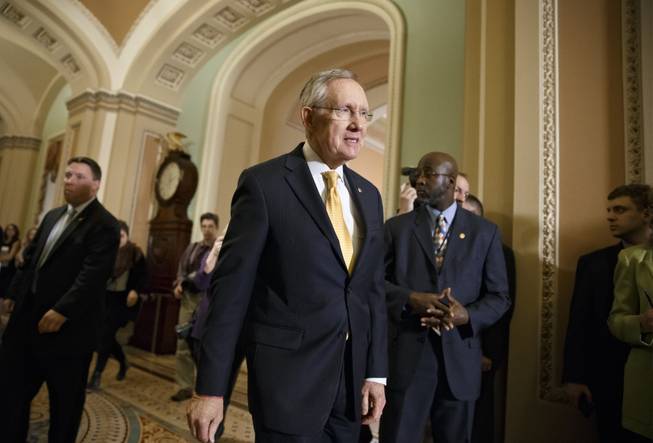
J. Scott Applewhite / AP
Senate Majority Leader Harry Reid, D-Nev., walks to meet with reporters following a Democratic policy luncheon at the Capitol in Washington, Tuesday, Jan. 14, 2014.
Monday, Feb. 3, 2014 | 6:03 p.m.
The farm bill is a congressional tradition that generally doesn’t fully engage Nevada lawmakers, since the legislation’s changes to crop insurance and farm subsidies don’t have much of an impact in Nevada, especially when compared to other states.
But this year, Senate Majority Leader Harry Reid wants Nevadans to know counties here will benefit from this year’s farm bill, thanks to an extension of federal payments in lieu of taxes, or PILT funding.
“Every county gets something,” Reid said in a conference call Monday afternoon with Nevada reporters.
He detailed how each of the state’s 17 county would see somewhere in the range of $2.8 million to $3.2 million from the extension of the provision that pays counties money they can’t collect from businesses and entities operating on federal land within their governance area.
There isn’t actually a change to the PILT funding level, which remains only a fraction of the tax revenue that Nevada’s counties would be able to collect from directly taxable land. But, Reid said, the money is “essential.”
There are a few other provisions in the farm bill of interest to Nevada as well, such as $7 billion in disaster relief to help farmers adversely affected by ongoing drought conditions. Funding for such disaster relief had expired; payments to affected farmers are supposed to be retroactive under the farm bill, which also “creates a permanent baseline of funding so disaster funding won’t lapse again,” Reid said.
The bill also addresses wildfire mitigation – a key component of Nevada’s strategy in fighting off the otherwise impending listing of the greater sage grouse as an endangered species. Placing the bird on the federally protected list would precipitate the shutdown of major swaths of Nevada’s economy by requiring more regulations, stricter permitting and a curtailed use of federal lands, all of which would stymie the state’s mining, energy and ranching sectors.
Reid and U.S. Sen. Dean Heller, R-Nev., are circulating a “talking draft” of a bill to further these objectives as well.
The farm bill “doesn’t do it all, but it’s complementary to what we’re trying to do,” Reid said of the sage grouse provisions. “This is a very difficult issue because it affects mining and ranching … we’re trying to thread this needle.”
“Everyone should understand: It’s not going to be easy,” Reid added.
Reid also expressed satisfaction with how provisions cutting food stamp funding turned out for Nevadans. The bill cuts about $8 billion from the Supplementary Nutritional Assistance Program, but because the savings come from limiting program advertising and ending a practice that let recipients of home heating aid automatically qualify for food stamps, “that doesn’t impact Nevada,” Reid said.
Certain Nevada food banks, like the Three Square Food Bank of Nevada, have been urging lawmakers to vote for the farm bill because it also provides extra money for food-assistance programs.
The Senate is scheduled to vote on the legislation this week. Last week, the House voted 251 to 166 to pass the farm bill. Reps. Steven Horsford, D-Nev., and Joe Heck, R-Nev., voted for it; Rep. Dina Titus, D-Nev., voted against it, citing concerns with the food stamp cuts.

Join the Discussion:
Check this out for a full explanation of our conversion to the LiveFyre commenting system and instructions on how to sign up for an account.
Full comments policy